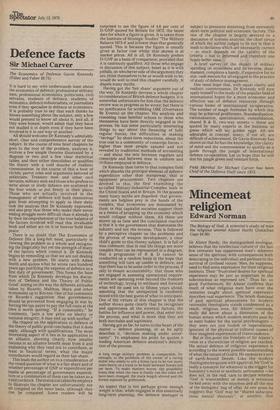Mincemeat religion
Edward Norman
The Biology of God. A scientist's study of man the religious animal Alister Hardy (Jonathan Cape £4.50) Sir Alister Hardy, the distinguished zoologist, believes that the intellectual culture of the last few centuries has suppressed men's inherent sense of the spiritual, with consequences both desiccating to the individual and perilous to the survival of civilised values. Men, he supposes, need to find some expression for their religious instincts. Their "frustrated desires for spiritual experience may be just as important in the subconscious as repressed sex." Thus far, so good. Furthermore, Sir Alister confirms that much of what religious men have over the centuries taught about spiritual experience describes real experience. The brash dismissal of past spiritual phenomena by modern rationalist theologians stands condemned as a result: religious men, Sir Alister contends, really did know about a dimension of the human senses which modern analysts pass by as mere fodder for the social psychologists they were not just foolish or superstitious, ignorant of the physical or cultural causes of their imagined experiences of transcendence. But at this point the frontiers of Sir Alister's value as a theoretician of religion are reached. His actual defence of religious experience is according to the lowest possible understanding of what the nature of God is. He embraces a sort of earth-bound Deism. Like the modern theologians he quotes with approval, his 'God' is really a synonym for whatever is the trigger for humanity's moral or aesthetic seriousness -he does not, in the end, care to declare whether 'God' is transcendent or merely a sensation locked away with the enzymes and all the rest of the biologists' bag of offal. At one point he suggests that 'God' may be "shared subsconscious mental elements"; at another, that


































 Previous page
Previous page